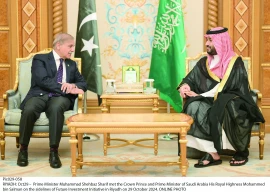
Today, Dr Khan aims to support thousands of families, not just his own. His research at the Institute for Sustainable Halophyte Utilisation Centre at the University of Karachi is focused on finding a solution to the food crisis in Pakistan and perhaps the world.
Making something out of nothing
Over two decades ago, Dr Khan travelled through Sindh for a university project when he was struck by how much land was barren. “Up to fifty per cent of Pakistan’s land has become saline,” he says, “it is a wasteland.”
Acres of land lay empty while hundreds of people remained hungry. The math did not add up. Dr Khan began exploring ways to make use of halophytes which are salt tolerant plants to change the environment. “There are over 150 types of halophytes in Pakistan which gives us an edge in research,” he says. According to Dr Khan halophyte research is “truly a third world domain.” The idea of using a halophyte is simple. Instead of traditional farming halophytes can be used in saline areas to graze livestock, develop edible oil, bio-fuel or medicinal plants. The only major difference is that brackish water is used instead of fresh water.
Research with dividends
Could halophytes be the solution to all our problems? “Very possibly, yes,” says Dr Khan. The professor has spent a lifetime investigating how to make use of salt tolerant plants. He can now grow 60,000 tons of fodder per hectare per year. He realises the technology would be financially beneficial for any investor.
“A farmer cannot do what I am doing,” he says in sheer frustration “and I cannot be a marketer. I cannot ‘sell’ myself but I know I need the support of multinational companies.”
While only two per cent of all plants are halophytes if they are developed they could help the community and the local economy but so far Dr Khan struggles for financial support in all quarters – academic, government and private.
Back-end support
The institute, where Dr Khan is director, has been struggling with funds for some time. “I have asked the Higher Education Commission for a recurring grant but I have not received one,” he says. “The university has allocated Rs1.5 million which is not even enough for our maintenance bill.” Dr Khan requested a Rs51.76 million grant from the HEC this summer but this was denied as well.
Private groups have chosen to play it safe. Dr Khan says no local company wants to invest in new technology in Pakistan, even technology that could feed the country.
A moment of truth for the professor arrived when he was awarded a Pride of Performance award by then President Pervez Musharraf. “I did not care about the award. I told the President all I wanted was a chance to make a difference,” he says.
The professor says he was introduced to the Minister for Agriculture who passed him on to a secretary who asked him to make a presentation from where he was entangled in a bureaucratic mess which was never resolved. “I have given up on government support now,” he says.
Published in The Express Tribune, September 11th, 2010.


1719660634-1/BeFunky-collage-nicole-(1)1719660634-1-165x106.webp)

1732276540-0/kim-(10)1732276540-0-165x106.webp)




1724249382-0/Untitled-(640-x-480-px)1724249382-0-270x192.webp)







COMMENTS
Comments are moderated and generally will be posted if they are on-topic and not abusive.
For more information, please see our Comments FAQ